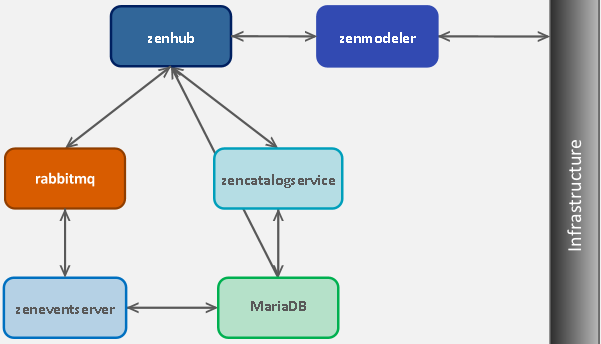Modeling
Modeling is the process of discovering device information. It isn't monitoring. Modeling doesn't collect availability or performance data.
Modeling devices
Resource Manager can use SSH, WinRM, and SNMP to model devices. As a best practice, use SSH or WinRM.
The modeling method that you select depends on your environment and the types of devices that you want to model and monitor.
By default the system remodels each known device every 720 minutes (12 hours). You can change the frequency with which devices are remodeled. Edit the value of the Modeler Cycle Interval in the collector's configuration.
For larger deployments, modeling frequency might affect performance. In
such environments, set the startat configuration setting inside the
zenmodeler.conf file to change the scheduling of the daemon. The
startat value only dictates the initial start time of zenmodeler. Each
subsequent run interval is determined by the zenmodeler cycle time
(number of minutes between runs). The cycle time is configured on the
daemon settings page inside the parent's collector folder, which you can
access in Control Center. For more information, refer to the
Procedures section below.
The following figure shows how the zenmodeler daemon fits into the modeling devices portion of the Resource Manager architecture. Note that MariaDB replaced ZenDS (MySQL) in version 5.x and later and stores the object database (ZODB).
Procedures
The following procedures describe how to configure the modelling frequency for Zenoss Resource Manager. You can edit the configuration file from either the Control Center UI or the Zenoss Resource Manager.
Note
A minimum access of global zenmanager is required to edit the zenmodeler configuration file through the Zenoss Resource Manager.
From the Control Center UI
- From the Control Center UI, click Zenoss.resmgr.
- Navigate to Zenoss > Collector > localhost.
- Find your collector. Scroll down to zenmodeler.
- Click zenmodeler.
- Scroll up to Configuration Files.
- Locate the
zenmodeler.conffile. -
Click Edit to display the editor dialog box.
-
Scroll down to the entry:
#startat None -
Add an entry to the the zenmodeler.conf file. For example, to start zenmodeler's first cycle at midnight, create the following five fields:
startat 0 0 * * *Note
The zenmodeler.conf configuration file uses the same format as crontab for its initial run, which doesn't set zenmodeler's cycle interval. See zenmodeler.conf File Format below for additional information.
-
-
Click Save to save and exit the editor dialog box.
-
Restart zenmodeler to apply the changes.
Note
No other restart is required.
From the Resource Manager UI
- Log in to the Zenoss Resource Manager UI.
- Click Advanced.
- Click Control Center.
- Scroll down to zenmodeler.
- Change the display drop down to Configuration Files.
-
Edit the file within the
zenmodeler.conffile pane:-
Scroll down to the entry:
#startat None -
Add an entry to the
zenmodeler.conffile. For example, to run zenmodeler's first cycle at midnight, create the following (five fields):startat 0 0 * * *Note
The zenmodeler.conf configuration file uses the same format as crontab for its initial run, which doesn't set zenmodeler's cycle interval. See zenmodeler.conf File Format below for additional information.
-
-
Click Save to save the changes. A yellow flare message in the top bar indicates the file is successfully changed.
- Restart zenmodeler to apply the changes.
zenmodeler.conf File Format
The zenmodeler.conf file has several options for controlling when modeling is performed.
| Option | Default | Description |
|---|---|---|
| cycletime | {{ getContext . "cycletime" }} |
The time (in minutes) between remodeling. The default value is used to import the Modeler Cycle Interval (minutes) value from the Advanced > Control Center page. |
| startat | None |
Specific times for zenmodeler to remodel devices. startat values use crontab syntax (see below). |
| now | False |
Specifies whether zenmodeler should model immediately on startup. Zenoss recommends a value of False to prevent modeling load in the event that services are restarted. |
The startat option uses the same format as crontab.
Excerpt from the crontab(5) man page:
The time and date fields are:
field allowed values
----- --------------
minute 0-59
hour 0-23
day of month 1-31
month 1-12 (or names, see below)
day of week 0-7 (0 or 7 is Sunday, or use names)
An asterisk (*) in a field always stands for "first-last".
Ranges of numbers are allowed.
Ranges are two numbers separated with a hyphen.
The specified range is inclusive.
Lists are allowed.
A list is a set of numbers or ranges separated by commas.
Examples: "1,2,5,9", "0-4,8-12".
